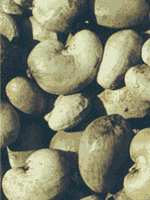|
Products
Three main cashew products are traded on the international market - raw nuts, cashew
kernels and cashew nut shell liquid (CNSL). A fourth product - the cashew apple
is generally processed and consumed locally.
Cashew nuts

|
The raw cashew nut is the main commercial product of the cashew tree, though yields
of the cashew apple are eight to ten times the weight of the raw nuts. Raw nuts
are either exported or processed prior to export. Processing of the raw nuts releases
the by-product CNSL that has industrial and medicinal applications. The skin of
the nut is high in tannins and can be recovered and used in the tanning of hides.
The fruit of the cashew tree that surrounds the kernel can be made into a juice
with a high vitamin C content and fermented to give a high proof spirit.
|
Cashew kernels
It is estimated that 60 percent of cashew kernels are consumed in the form of snacks
while the remaining 40 percent are included in confectionery. The cashew competes
in the same market as other edible nuts including almonds, hazels, walnuts, pecans,
macadamias, pistachios and peanuts. There has recently been a considerable rise
in demand for edible nuts by consumers interested in quality and health aspects
of food. The breakfast cereal, health food, salads and baked goods markets are all
expanding markets for cashew nuts.
One major factor that affects the consumption of cashew kernels in world markets
is competition from other tree nuts. The major importers in developed countries
contract their requirement for the whole year based on the sales from previous years.
If prices of a commodity fluctuate over a wide range, they will not want to trade
in that item for fear of incurring heavy losses. Since cashew cultivation is not
organised on a plantation scale in most producing countries, year to year variation
in crop yield is a regular feature resulting in wide price fluctuations for cashew
kernels. On the other hand, almonds and pistachios are grown in very large plantations
in the United States and thus their prices are steady year after year.
Cashew nut shell liquid
Cashew nut processing allows for the development of an important by-product which
can increase its added value. The liquid inside the shell (CNSL) represents 15 percent
of the gross weight and has some attractive possible medicinal and industrial uses.
CNSL is one of the few natural resins that is highly heat resistant and is used
in braking systems and in paint manufacture. It contains a compound known as anacardium,
which is used to treat dermatological disorders. The main markets for CNSL are the
United States, the European Union (mainly the United Kingdom), Japan and the Republic
of Korea. Together these account for over ninety percent of world trade, most of
which is supplied by India and Brazil.
Product standards
FPO specifications for fruit products
Products
|
Minimum fruit juice %
|
Minimum TSS%
|
Acidity max. %
|
Max. preservative (free SO2) ppm
|
|
Squash
|
25
|
40
|
3.5
|
350
|
|
Syrup
|
25
|
65
|
3.5
|
350
|
|
Ready to serve beverages
|
10
|
10
|
---
|
70
|
BIS Specifications
The revised specification of Bureau of Indian Standard, New Delhi, for untreated
Cashewnut Shell Liquid (IS:840-1964).
|
Specific gravity 30º/30º
|
0.950 to 0.970
|
|
Viscosity at 30ºC in centipoises
|
550
|
|
Moisture, percent by weight
|
1.0
|
|
Matter insoluble in toluene, percent by weight
|
1.0
|
|
Loss in weight on heating, percent by weight
|
2.0
|
|
Ash, percent by weight
|
1.0
|
|
Top
|